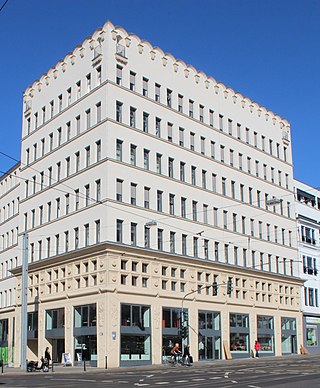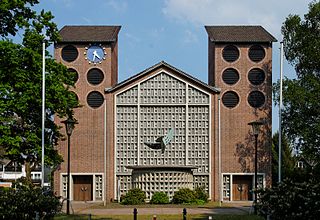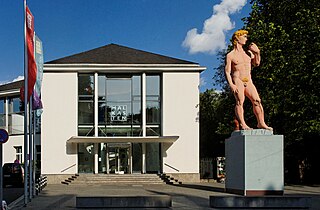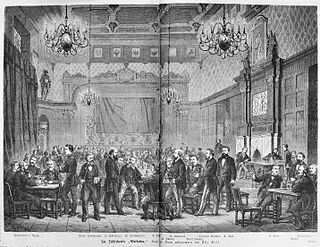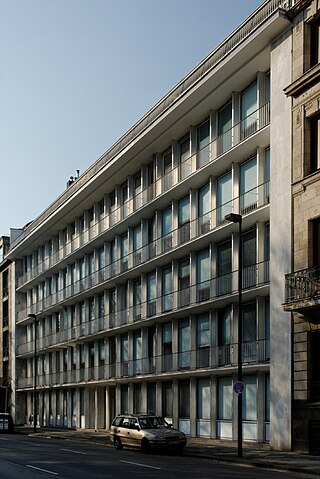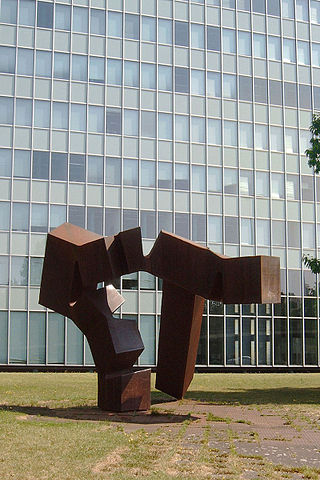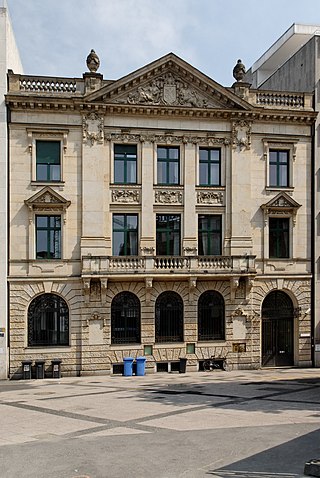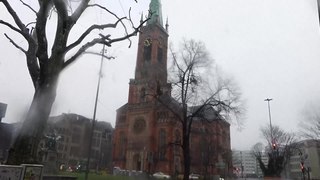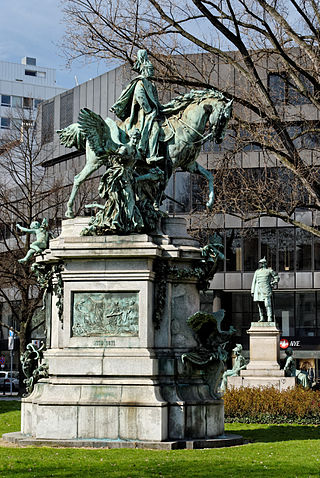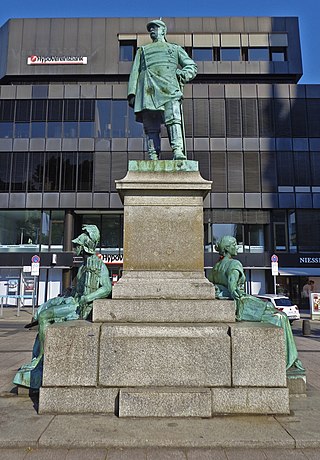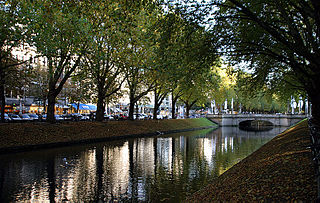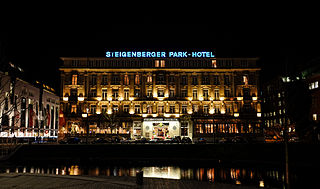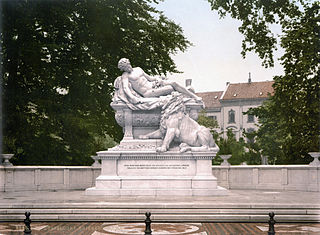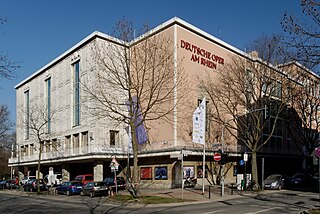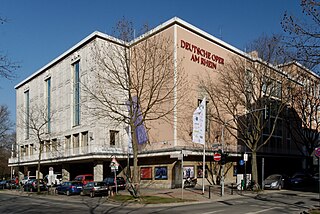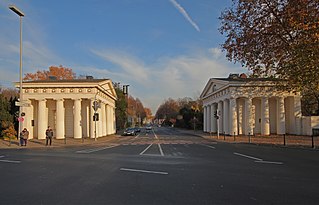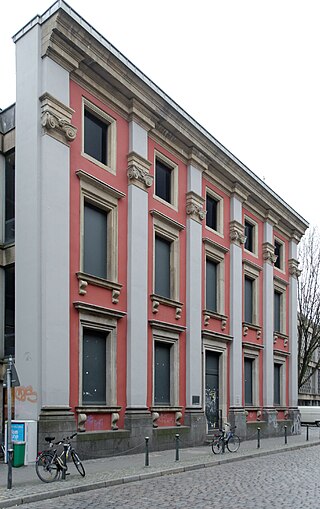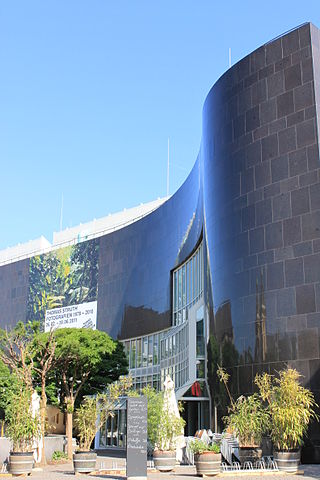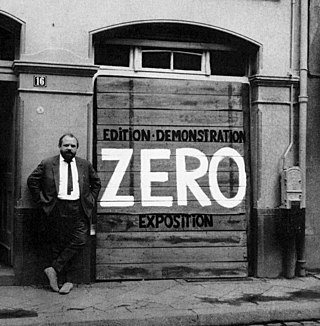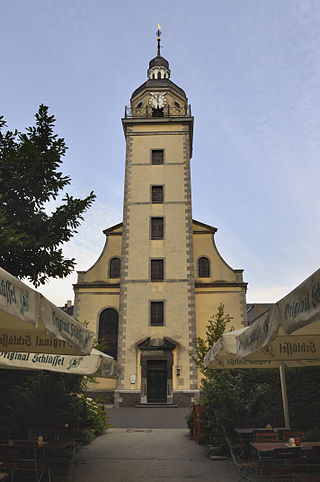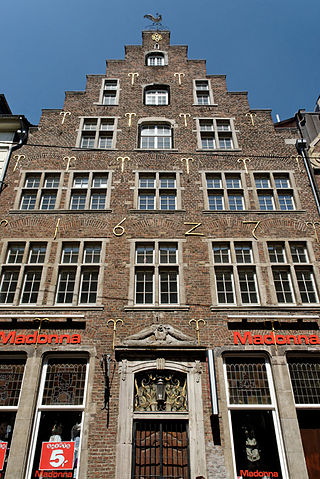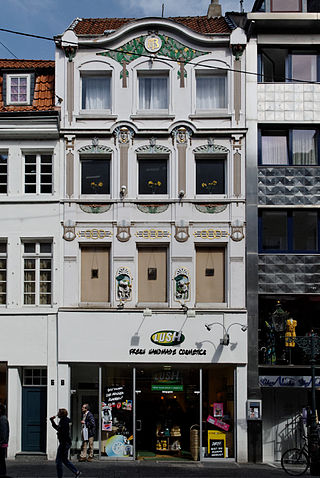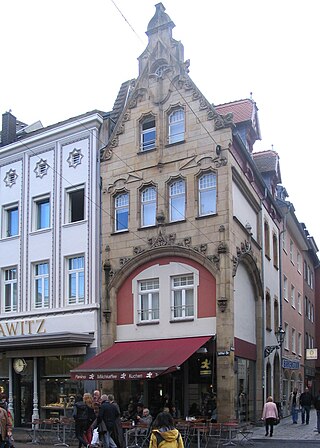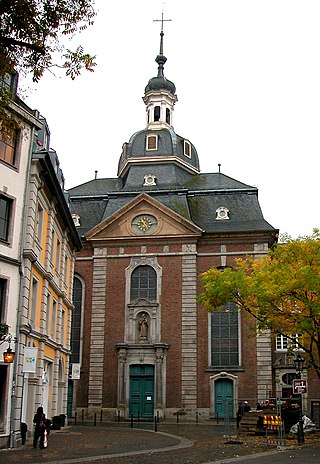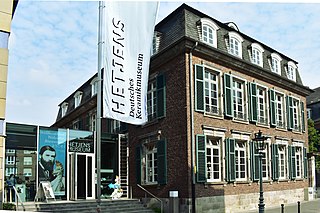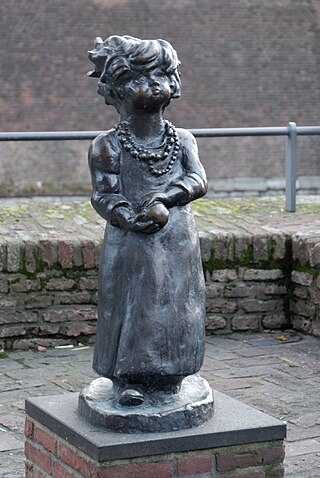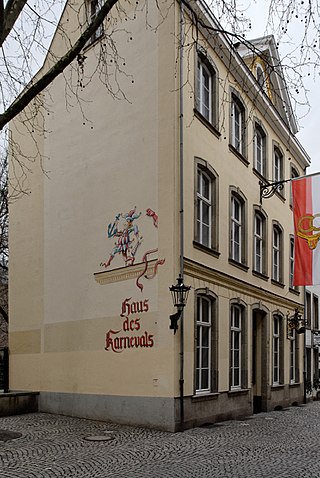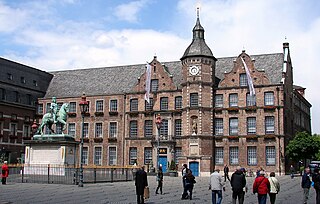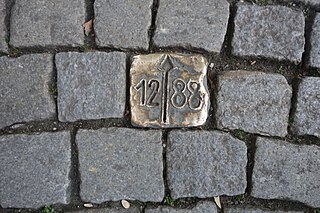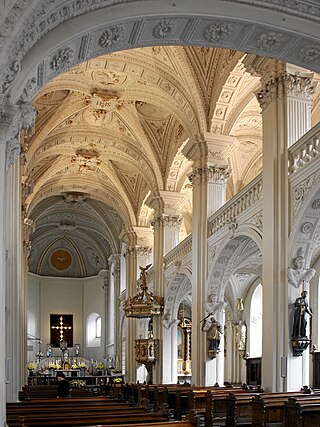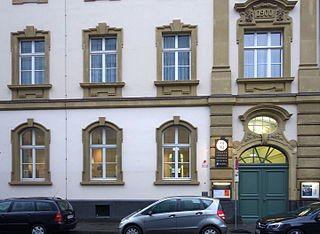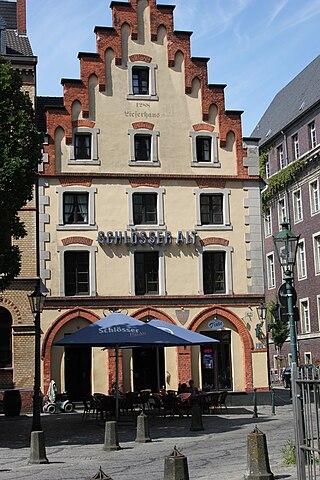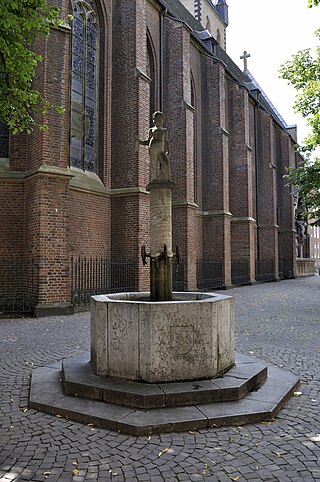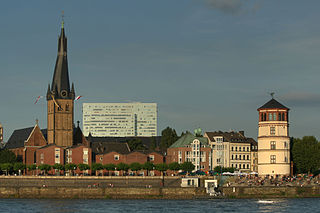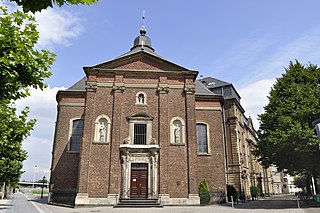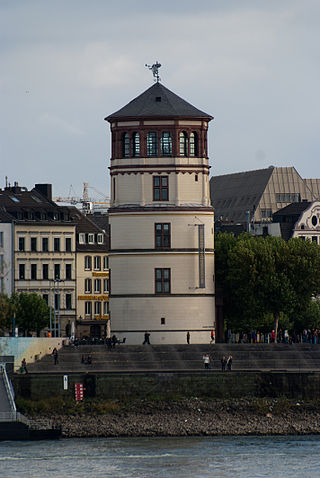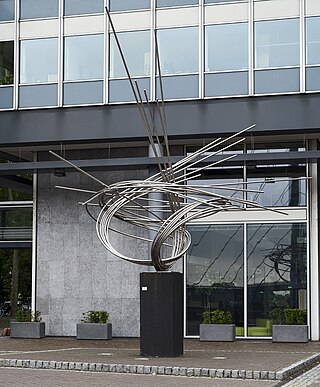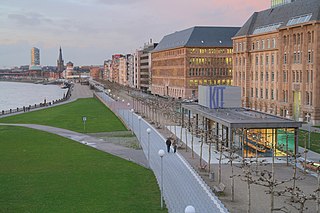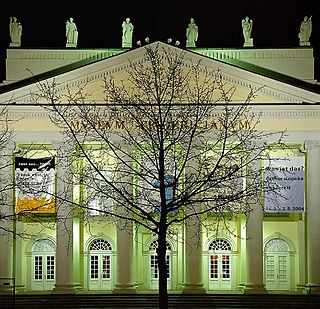Self-guided Sightseeing Tour #3 in Dusseldorf, Germany
Legend
Guided Free Walking Tours
Book free guided walking tours in Dusseldorf.
Guided Sightseeing Tours
Book guided sightseeing tours and activities in Dusseldorf.
Tour Facts
9.9 km
141 m
Experience Dusseldorf in Germany in a whole new way with our free self-guided sightseeing tour. This site not only offers you practical information and insider tips, but also a rich variety of activities and sights you shouldn't miss. Whether you love art and culture, want to explore historical sites or simply want to experience the vibrant atmosphere of a lively city - you'll find everything you need for your personal adventure here.
Activities in DusseldorfIndividual Sights in DusseldorfSight 1: Industriehaus am Wehrhahn
The Industriehaus Düsseldorf is a listed office and commercial building in Düsseldorf-Pempelfort, Schirmerstraße 80/Am Wehrhahn.
Sight 2: St. Elisabeth
The Roman Catholic Church of St. Elisabeth, also known as St. Elisabeth's Church, is located on Vinzenzplatz in Düsseldorf-Stadtmitte and bears the patronage of St. Elisabeth of Thuringia. It is the only church in the city built into a row of houses and has been a listed building since 1983.
Sight 3: Malkasten-Haus
The Malkasten House is the social house of the Malkasten artists' association. It is located at Jacobistraße 6a in Düsseldorf-Pempelfort.
Sight 4: Malkasten
Malkasten is a progressive German artists' association, founded in Düsseldorf in 1848, during the March Revolution. Since 1867, their headquarters have been in the Pempelfort district.
Sight 5: Malkasten Park
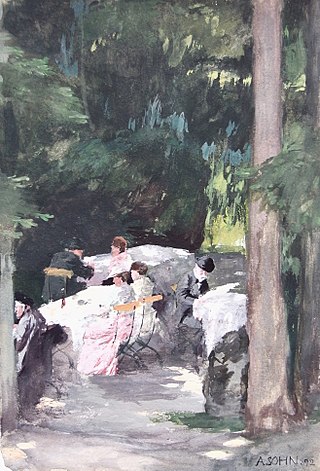
The Malkastenpark is a historic private park, now in the centre of Düsseldorf, North Rhine-Westphalia, Germany. The name refers to a group of artists, Malkasten, founded in 1848. The park is also known as the Jacobigarten, after the original owners who created a Baroque garden. It is now a public garden with both Baroque features and English landscape garden elements, and a listed historic monument.
Sight 6: Aluminiumhaus
The listed aluminium house at Jägerhofstraße 29 in Düsseldorf-Pempelfort was built between 1952 and 1953 according to plans by Helmut Hentrich and Hans Heuser as a residential and office building for the Olga van Meeteren company. The employee was Hubert Petschnigg. The name is derived from the appearance of the building with the aluminium-clad building supports that vertically structure the glass façade.
Sight 7: Monumento
Monumento, also known as Rumor de límites IX, is the title of a sculpture by the Spanish sculptor Eduardo Chillida. It is the first and first larger sculpture by the artist made of steel to be erected in Germany. To mark the 100th anniversary of the rolled steel factory Thyssen & Co., founded by August Thyssen, the property was donated to the city of Düsseldorf, the headquarters of one of the company's successors, and unveiled on July 8, 1971 in a green area at the Dreischeibenhaus in Düsseldorf-Stadtmitte.
Sight 8: Düsseldorfer Schauspielhaus
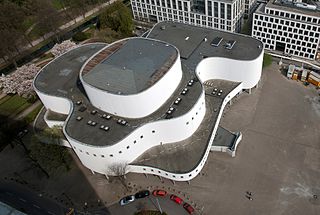
The Düsseldorfer Schauspielhaus is a theatre building and company in Düsseldorf. The present building with two major auditoria was designed by the architect Bernhard Pfau and built between 1965 and 1969. It opened in 1970.
Sight 9: Haus der Universität
The Haus der Universität at Schadowplatz 14 in Düsseldorf is an institution of the Heinrich Heine University in Düsseldorf. It was opened on 20 September 2013. Public events, conferences, exhibitions and student counselling take place there during opening hours from Monday to Saturday between 10 a.m. and 6 p.m. In addition, there is a service of the University and State Library Düsseldorf for researching scientific literature. With the new building and its facility in the city centre district, the university, whose campus is rather peripheral in the Bilk district, will have the opportunity to offer its information services in a more central location and thus more accessible to the public.
Sight 10: Johanneskirche
St John's Church, with its almost 88 m high tower, is the largest Protestant church in Düsseldorf. It is located at the Martin-Luther-Platz. The church was built from 1875 to 1881 in the Romanesque Revival style. It was severely damaged in World War II, but was saved from destruction and in 1953 it was reopened. The last major remodeling took place in 2008. There is a cafe through which one enters the actual church.
Wikipedia: Johanneskirche, Düsseldorf (EN), Website, Heritage Website
Sight 11: Kaiser-Wilhelm-Denkmal
The Kaiser Wilhelm Monument in Düsseldorf is one of numerous Kaiser Wilhelm monuments that were erected during the German Empire and glorifies Wilhelm I as its "founder of the Empire" and as the victor over the Second Empire.
Wikipedia: Kaiser-Wilhelm-Denkmal (Düsseldorf) (DE), Heritage Website
Sight 12: Bismarck-Denkmal
The Bismarck Monument in Stadtmitte, Düsseldorf, is one of the numerous Bismarck monuments erected in the Kingdom of Prussia and later in the German Empire since 1868.
Sight 13: Königsallee
The Königsallee is an urban boulevard in Düsseldorf, state capital of North Rhine-Westphalia, Germany. The Königsallee is noted for both the landscaped canal that runs along its center, as well as for the fashion showrooms and luxury retail stores located along its sides.
Sight 14: Steigenberger Parkhotel
Steigenberger Parkhotel Düsseldorf is a 5-Star Steigenberger Hotel in Düsseldorf, Germany, located on the city's famous Königsallee and next to the Hofgarten and the opera house.
Sight 15: Kriegerdenkmal im Hofgarten
The war memorial in the Hofgarten in Düsseldorf's city centre stands on the Landskrone, the landscape remodelled remnant of the former city fortifications in the Hofgarten. The monument was created by Karl Hilgers (1844–1925) after he had won an artist's competition with his design "Vaterstadt", which had been announced by the "Committee for the Erection of a War Memorial". The monument was inaugurated on 18 October 1892. It is dedicated to fallen Düsseldorf soldiers of the German Wars of Unification (1864–66) and the Franco-German War (1870/71).
Sight 16: Der Mahner
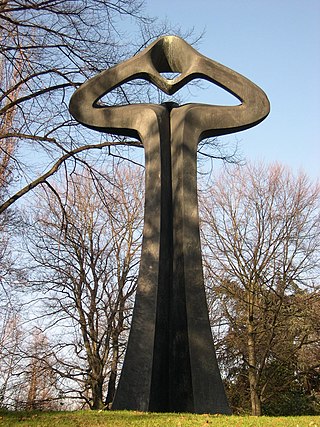
The Admonisher is the title of a bronze cast sculpture by Vadim Abramovich Sidur in the Hofgarten in Düsseldorf. The object, which is reminiscent of the biblical figure of the caller in the desert, is also interpreted as a memorial against totalitarianism and violence.
Sight 17: Opernhaus Düsseldorf
Opernhaus Düsseldorf is a venue and administrative headquarters of the Deutsche Oper am Rhein.
Sight 18: German Opera on the Rhine
The Deutsche Oper am Rhein is an opera company based in Düsseldorf and Duisburg. The opera also has an associated classical ballet company. Axel Kober has been its Music Director since 2009. The resident orchestra, the Düsseldorfer Symphoniker, play both opera and symphonic repertoire.
Sight 19: Ratinger Tor
Get Ticket*The Ratinger Tor is the last and only remaining city gate of the original city of Düsseldorf. However, the current building is not the medieval city gate, but a customs gate that was built between 1811 and 1815 in the classicist style. The need for a new building arose from the demolition of the fortifications stipulated in the Treaty of Lunéville, to which the old gate fell victim. The new Ratinger Tor was moved by about 115 m to the east, which made it possible to extend Ratinger Straße by 60 m and to create a boulevard, today's Heinrich-Heine-Allee.
Sight 20: Palais Spinrath
The Palais Spinrath in Düsseldorf was originally a convent of the Celestian nuns, which was built from 1696 to 1712 by Matteo Alberti at Ratinger Straße 15.
Sight 21: K20 - Kunstsammlung NRW
The Kunstsammlung Nordrhein-Westfalen is the art collection of the German Federal State of North Rhine-Westphalia, in Düsseldorf. United by this institution are three different exhibition venues: the K20 at Grabbeplatz, the K21 in the Ständehaus, and the Schmela Haus. The Kunstsammlung was founded in 1961 by the state government of North Rhine-Westphalia as a foundation under private law for the purpose of displaying the art collection and expanding it through new acquisitions.
Sight 22: Galerie Schmela
Galerie Schmela in Düsseldorf was a gallery founded in 1957 by the art dealer Alfred Schmela. It is considered one of the most important and first private art galleries of the post-war period in the Federal Republic of Germany. The gallery house, which opened in 1971 and is currently called the Schmela House, has served as the third location for exhibitions for the Kunstsammlung Nordrhein-Westfalen since November 2009 and was rented to the gallery owner Hans Mayer and his son Max from summer 2020.
Sight 23: Neanderkirche
The Neanderkirche is a Protestant church in the centre of Düsseldorf, the Altstadt. The building in early Baroque style was completed in 1687 and later named after the Reformed minister and hymn writer Joachim Neander. It is now a parish church of the Evangelische Kirchengemeinde Düsseldorf-Mitte. In 1965, a Rieger organ was installed, which is also used for a series of summer concerts.
Sight 24: Heine Haus
The Heine Haus is a cultural institution in Düsseldorf's old town, located in the building Bolkerstraße 53, where Heinrich Heine's birthplace was located until about 1821. The house, which has initially been considered a centre for literature since 2006 and has been fulfilling its function as the "Heine Haus Literaturhaus Düsseldorf" since 2017, is dedicated to the mediation and promotion of German-language and international contemporary literature. It is run in a public-private partnership between the state capital of Düsseldorf, the Förderverein Heine Haus e.V. and the literary shop Müller & Böhm, which is located in the front area of the building. In the rear area there is an event room with a literature café.
Wikipedia: Heine Haus (Düsseldorf) (DE), Website, Heritage Website
Sight 25: Haus zum Kurfürsten
The Haus zum Kurfürsten is located at Flinger Straße 36 in the Altstadt district of the North Rhine-Westphalian state capital Düsseldorf.
Sight 26: Zum weißen Füchschen
The house at Flinger Straße 8 in Düsseldorf's old town is a listed building whose façade has Art Nouveau decoration.
Sight 27: Schneidersches Geschäftshaus
The former Schneider office building in Düsseldorf's old town was built in 1896 or 1898 according to designs by the Düsseldorf architect Hermann vom Endt. On September 2, 1983, the corner house was placed under monument protection. On the ground floor of the building there is now a boutique.
Wikipedia: Schneidersches Geschäftshaus (DE), Heritage Website
Sight 28: Marionettentheater Düsseldorf
Düsseldorfer Marionetten-Theater is a marionette theatre in Düsseldorf, North Rhine-Westphalia, Germany.
Sight 29: St. Maximilian
The Catholic Church of St. Maximilian, today usually called Maxkirche, in the Düsseldorf district of Carlstadt is a late Baroque church that emerged from a Franciscan monastery that was abolished in 1804. The monastery, whose living and utility rooms were located in the immediately adjacent Maxhaus, was founded in the 17th century, and the current church was built in the 18th century.
Wikipedia: Maxkirche (Düsseldorf) (DE), Website, Heritage Website
Sight 30: Hetjens-Museum
Das Hetjens – Deutsches Keramikmuseum ist ein am 9. Mai 1909 gegründetes Düsseldorfer Museum für Keramikgeschichte. Aufgrund der bis zu 8000 Jahre alten und aus allen Teilen der Welt stammenden Stücke seiner Sammlung gilt es als das universellste Institut seiner Art und ist regelmäßig mit Leihgaben im In- und Ausland vertreten.
Sight 31: Ehra oder Kind mit Ball
Ehra or Child with Ball or Sinti Girl Ehra is a work of art by Otto Pankok.
Sight 32: Haus des Karnevals
The House of Carnival is a historic building in Düsseldorf's old town at Zollstraße 9, which has housed a museum on the theme of Düsseldorf Carnival since 15 January 2005. The house also serves as the office of the Düsseldorf Carnival Committee and offers exhibitions on customs on three floors, where uniforms, medals, books and certificates as well as photos of over 60 years of Düsseldorf Carnival are shown. In the building, not far from the market square at the town hall, there is also a media archive in cooperation with the Westdeutscher Rundfunk with film footage of the Shrove Monday processions.
Sight 33: Jan-Wellem-Denkmal
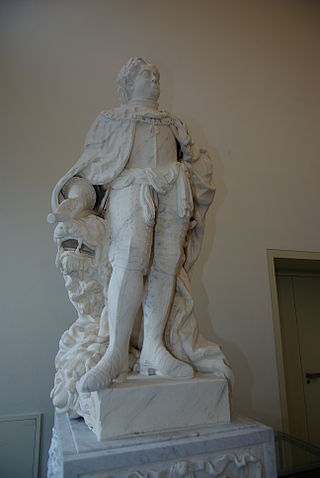
The Jan Wellem monument in Düsseldorf's town hall was completed by the sculptor Gabriel de Grupello after 1697/before 1708. The marble statue depicts Johann Wilhelm von Pfalz-Neuburg, called Jan Wellem, Elector Palatine and Duke of Jülich-Berg by the people of Düsseldorf, who spoke Lower Franconian at the time.
Wikipedia: Jan-Wellem-Denkmal (Düsseldorf) (DE), Heritage Website
Sight 34: Altes Rathaus
The old town hall in Düsseldorf is the wing on the northern side of the market square and the oldest part of the town hall complex in the old town of Düsseldorf. It was built in the style of the Renaissance between 1570 and 1573 as the office and meeting place for mayors, Schöffen and the city council. Until 1806, the town hall also served as the meeting place of the lands of the Duchy of Jülich-Berg. Previously, a house had been used as a town hall since 1544, which had been on the same place on the market square and had gradually become dilapidated. Before that, the house “Zum Schwarzen Horn” at Ratinger Straße 6 had served as a town hall since 1470. In the construction of the town hall of 1573, the upward development of the city is expressed under the Märkische Duken von Jülich-Kleve-Berg. Under Wilhelm, she experienced a considerable expansion as a preferred residence city. Nevertheless, the city had great effort to raise the funds for the construction costs and had to tackle the sovereign for help several times.
Wikipedia: Altes Rathaus (Düsseldorf) (DE), Heritage Website
Sight 35: Stadterhebungsmonument
The City Elevation Monument is a monument commemorating the granting of city rights to Düsseldorf. It is located on Joseph-Wimmer-Gasse at the corner of Müller-Schlösser-Gasse in the old town. The sculpture was made by Bert Gerresheim. It was erected in 1988 on the occasion of the 700th anniversary celebration. The motifs include the Battle of Worringen, the sealing of the town charter and the elevation of the parish church dedicated to St. Lambertus to a canonical monastery.
Sight 36: St. Andreas
The Church of St. Andreas is a Roman Catholic parish church situated in the center of the German city of Düsseldorf. It is the priory church of the local community of Dominican Friars, who also administer the much older Collegiate Church of St Lambertus.
Sight 37: Mahn- und Gedenkstätte für die Opfer der nationalsozialistischen Gewaltherrschaft
The Düsseldorf Memorial for the Victims of National Socialist Tyranny is a cultural institute of the state capital of Düsseldorf. It is a museum, research facility and archive. The house was opened in 1987 and has since been dedicated to the memory of Düsseldorf's victims and persecuted by the Nazi regime. It is located in the western part of the historic Stadthaus in the old town and, since a thorough renovation and its reopening in May 2015, has been showing the permanent exhibition "Düsseldorf Children and Young People under National Socialism".
Sight 38: Lieferhaus
The Löwenhaus or, as the house inscription says, Lieferhaus, Liefergasse 9 in Düsseldorf, is a listed building. It is the oldest secular building in Düsseldorf in Stein; the building core is Gothic.
Sight 39: Fischerjungen-Brunnen
The Fisherman's Boy Fountain is located on Stiftsplatz near the Church of St. Lambertus in Düsseldorf's Old Town.
Sight 40: St. Lambertus
St. Lambertus is one of four Roman Catholic churches in Düsseldorf's Old Town on Stiftsplatz. It is the parish church of the enlarged parish of St. Lambertus Düsseldorf, which was created in 2011 by the merger of the parishes of St. Lambertus, St. Maximilian and St. Mariä Empfängnis. Their church consecration festival forms the spiritual background of the "Largest Funfair on the Rhine".
Wikipedia: St. Lambertus (Düsseldorf) (DE), Website, Heritage Website
Sight 41: Josephskapelle
The baroque Joseph's Chapel in Düsseldorf's old town on today's Emilie-Schneider-Platz was designed as a convent chapel of the Düsseldorf Carmelite nuns and has the floor plan of a Greek cross.
Wikipedia: Josephskapelle (Düsseldorf) (DE), Heritage Website
Sight 42: Schifffahrtsmuseum
The Maritime Museum in Düsseldorf shows one of the oldest collections on the history of Rhine navigation in Germany and has been housed in the historic castle tower on the banks of the Rhine since 1984.
Wikipedia: Schifffahrtsmuseum (Düsseldorf) (DE), Website, Website
Sight 43: Große Mannesmann
The Große Mannesmann, also known as Mannesmann I or Movement, is a sculpture by the sculptor Norbert Kricke. It was created from 1958 onwards in the context of informal art as a commissioned work for Mannesmann AG and was erected in 1961 on its forecourt at the Mannesmann high-rise in Düsseldorf. Together with the high-rise, the property has been a listed building since 1997.
Sight 44: KIT - Kunst im Tunnel
Kunst im Tunnel or KIT is a contemporary art museum in Düsseldorf. It is the new exhibition space of Kunsthalle Düsseldorf, located within the Rheinufertunnel - hence the name. It has an underground exhibition area of 850m².
Sight 45: Villa Horion
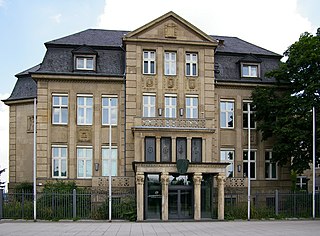
The Villa Horion on Johannes-Rau-Platz in Düsseldorf-Carlstadt was built at the same time as the neighbouring Landeshaus from 1909 to 1911 by the architect Hermann vom Endt in the Neoclassical style. The façade decoration, in particular two female relief figures, the "Fürsorge" and the "Landwirtschaft" were created by the sculptor Hermann Nolte. The listed building is located in the government district of the state capital. It is named after Johannes Horion, who resided here as governor of the Rhine Province. It currently houses the "House of Parliamentary History" of the North Rhine-Westphalian state parliament.
Sight 46: Eiche und Basaltsäule
7000 Oaks – City Forestation Instead of City Administration is a work of land art by the German artist Joseph Beuys. It was first publicly presented in 1982 at documenta 7.
Share
How likely are you to recommend us?
Disclaimer Please be aware of your surroundings and do not enter private property. We are not liable for any damages that occur during the tours.
GPX-Download For navigation apps and GPS devices you can download the tour as a GPX file.
